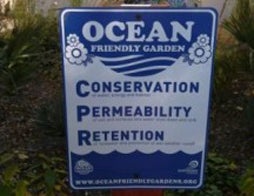The College of Charleston’s Grice Marine Lab is home to the first Ocean Friendly Garden in South Carolina. Grice’s Green Teaching Garden opened in April 2012 and provides opportunities for sustainable practices education and outreach in the Charleston community. An Ocean Friendly Garden (OFG) is a garden that applies CPR – Conservation, Permeability, and Retention – to revive the health of watersheds and oceans.
[Related: See Grice’s Green Teaching Garden on the Ocean Friendly Garden website.]
When Sharleen Johnson, a marine biology graduate student, became the Green Teaching Garden coordinator in May, she jumped at the chance to apply for Ocean Friendly Garden certification for the Grice Marine Lab garden.
“It seemed like a great way to raise awareness about sustainable practices, and it is already working!” Johnson explains. “Ashley Hall School’s biology teacher is now considering creating an Ocean Friendly Garden on their campus after visiting Grice as part of the CORAL (Community Outreach Research and Learning) program. This is the sort of cascading effect that I was hoping for and I’m thrilled that we might inspire children and their families to live more sustainably.”
 The Green Teaching Garden includes a primary rainwater collection system with a 1,500-gallon cistern, and a secondary system consisting of eight rain barrels. The cistern is used to irrigate four raised beds: an herb garden, perennial garden, vegetable garden, and a butterfly garden. The raised beds are surrounded by a heavily mulched rain garden that is filled with native plants. A compost area is set up for residents living and working at Grice Marine Lab. The Marine Biology Graduate Student Association leads the Green Teaching Garden project, which is funded by the College of Charleston Office of Sustainability’s ECOllective fund, the Masters of Environmental Studies program, Grice Marine Lab, the College’s grounds department, Clemson Extension’s Carolina Clear Program, and the Ashley Cooper Stormwater Education Consortium (ACSEC).
The Green Teaching Garden includes a primary rainwater collection system with a 1,500-gallon cistern, and a secondary system consisting of eight rain barrels. The cistern is used to irrigate four raised beds: an herb garden, perennial garden, vegetable garden, and a butterfly garden. The raised beds are surrounded by a heavily mulched rain garden that is filled with native plants. A compost area is set up for residents living and working at Grice Marine Lab. The Marine Biology Graduate Student Association leads the Green Teaching Garden project, which is funded by the College of Charleston Office of Sustainability’s ECOllective fund, the Masters of Environmental Studies program, Grice Marine Lab, the College’s grounds department, Clemson Extension’s Carolina Clear Program, and the Ashley Cooper Stormwater Education Consortium (ACSEC).
[Related: Learn more about the Green Teaching Garden.]
Gardens have to meet a set of criteria in order to receive Ocean Friendly Garden certification. Most Ocean Friendly Gardens are located near the ocean, but it isn’t required. Applying Ocean Friendly Garden principles would be a good thing to do anywhere in the United States in order to improve local and regional water quality.
The Surfrider Foundation created the Ocean Friendly Garden certification program and the Charleston chapter sponsored the purchase of Grice’s Ocean Friendly Garden sign.
[Related: See the criteria for a Ocean Friendly Garden certification.]
“It is possible that being involved with the Grice garden and in the Ocean Friendly Garden certification process will expand my network of contacts and lead to future job opportunities, but that’s not my main reason for doing it,” Johnson explains. “I enjoy plants and gardening, and teaching people about gardening, and consider it important to provide demonstration sites to show people what they can do to reduce their negative environmental impacts, such as by reducing stormwater runoff to improve water and habitat quality near where they live.”
The Ocean Friendly Garden initiative at Grice Marine Lab was funded by the College’s grounds department, Grice Marine Lab and the ACSEC.
For more information, contact Sharleen Johnson at johnsonsp3@g.cofc.edu.




